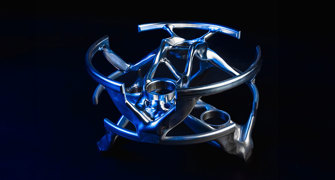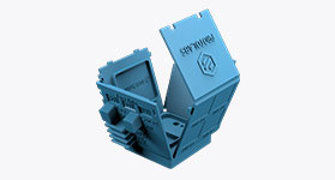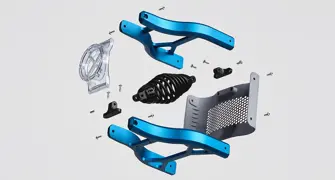
Japet Medical Devices
Protolabs is helping a French start-up to finalise an exoskeleton to combat lumbar pain.
Creator: Japet Medical Devices
Product: Atlas - rehabilitation exoskeleton
Industry: Medical and Health Care
Service: Injection Moulding
Japet Medical Devices is a French start-up specialising in medical robotics, created in 2016 by Antoine Noël and Damien Bratic who had both recently qualified from Centrale Lille University. The company, based in Lille’s Eurasanté park, is preparing to launch Atlas, the first functional rehabilitation exoskeleton designed to relieve lumbar pain.
Atlas is a true revolution in the world of medicine and has taken 4 years of R&D. The exoskeleton is made of two belts separated by micro-motors and has two functions: to apply traction on the vertebral column to relieve pain, then accompany the patient's movements so that they can strengthen their muscles pain-free through physical exercise. By allowing the patient to resume regular exercise, stimulated by a fun training interface, Atlas has broken the vicious circle of pain - inactivity - loss of muscle mass caused by lumbar pain and fits perfectly into the new treatment regimens recommended by the medical profession.
Atlas has also received the support of Europe's largest hospital infrastructure, Lille Regional University Hospital, which is assisting Japet Medical Devices in its development and clinical tests.
| At A Glance |
|---|
|
Japet Medical Devices is preparing to launch Atlas, the first functional rehabilitation exoskeleton. They need to produce the support parts and the encapsulation housing in good-quality material & with the tolerances of mass production, all in less than a month.
The efficiency of the ProtoQuote software and the design for manufacture (DFM) assessment meant that any defects were eliminated prior to moulding.
In just 2 weeks, Protolabs manufactured no less than 10 moulds, injected and delivered the polyamide and silicon parts, for a lower cost than other suppliers. |

The start-up's path crossed that of Protolabs at the approval stage of the definitive concept and its industrialisation. The aim was to produce the support parts (located between the micro-motors and the belt), as well as the encapsulation housing for the printed circuits and the battery in good-quality material and with the tolerances of mass production... all in less than a month. It was therefore Protolabs’ excellent reactivity that initially won over Salim Benabdallah, the engineer in charge of the DFM. In just 2 weeks, Protolabs manufactured no less than 10 moulds, injected and delivered the polyamide and silicon parts, for a lower cost than other suppliers (who told us it would take 4 to 8 weeks to deliver) were asking.
And if it all moved forwards so rapidly, it is also thanks to the technical assistance given by Protolabs. "We know the main principles of plastic injection but Protolabs helped us to analyse our parts in much greater detail. They guided us really well, which meant we could eliminate all the defects that could have appeared on unmoulding and control the tolerances of the parts. This last point is particularly important in a multi-disciplinary project like ours, that combines electronics, textiles and plastics", explained Salim Benabdallah. Thanks to their advice and the efficiency of the ProtoQuote software, the moulds were manufactured very rapidly and did not need any alteration.

Salim Benabdallah and Damien Bratic also highlight the quality of the discussions they had with their various contacts at Protolabs. They were available, ready to listen and reactive throughout the project.
The story does not stop there, however, as Protolabs are also going to produce the first series. "The costs and time lines corresponded to our goals and Protolabs' production capacity is compatible with our volumes" says Damien Bratic.
For their part, Protolabs is delighted to have contributed to the success of these talented young people (the average age of the Japet Medical Devices team is 27) who are passionate about their mission. And Protolabs is convinced that Atlas will achieve all the success it deserves.
About Japet Medical Devices
Japet Medical Devices's mission is to use robotics to develop solutions that will accelerate recovery or repair the human body.
Its patented technology was developed by a multidisciplinary team of neurosurgeons and rehabilitation doctors, engineers and designers. It has the potential to revolutionise the way in which our body recovers from musculoskeletal issues and will therefore doubtless have a major impact on the lives of many people.
Its first product, Atlas, targets lumbar pain which affects over 80% of the population at some point in their lives. It is used during daily exercise sessions in hospitals, rehabilitation centres, physiotherapy clinics or health centres, in the context of functional rehabilitation controlled by a trained professional.
Patients are guided in the exercises and their performance assessed throughout the treatment, using a fun interface that includes progressive "serious games" that target flexibility, balance, posture and proprioception.
Their quality of life improves rapidly and effectively, without medication.





